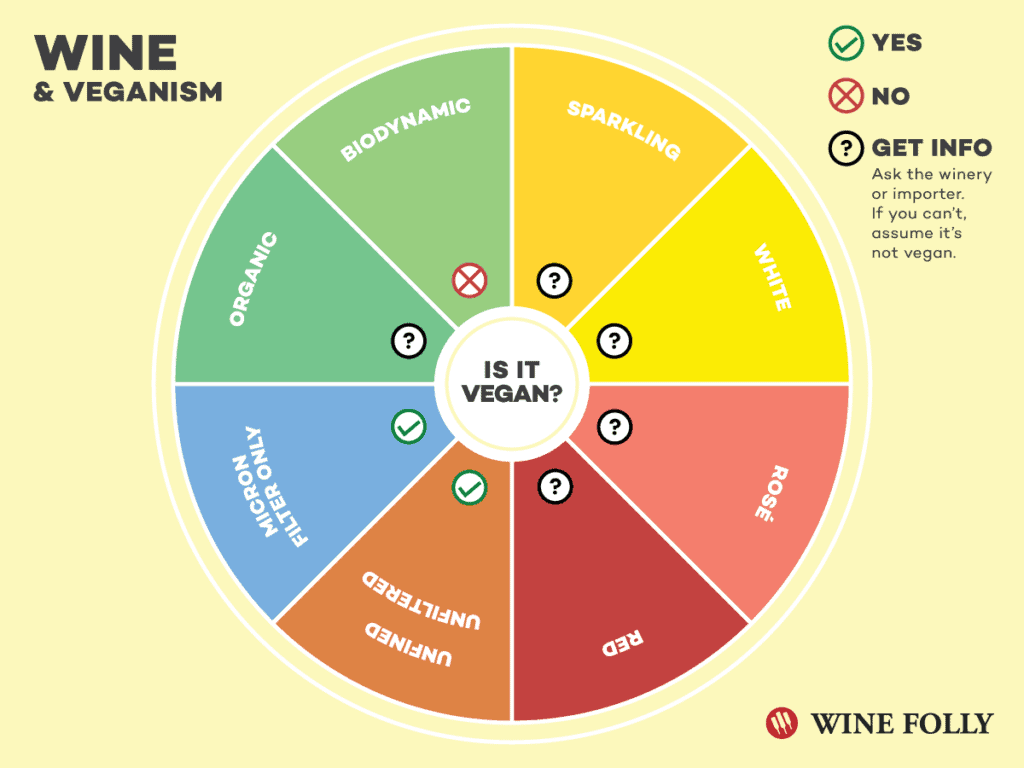When it comes to living a vegan lifestyle, many people focus on the food they eat. But did you know that your drink of choice can also have an impact on animal welfare? Enter vegan wine. But what exactly is vegan wine, and why should you care?
First and foremost, it’s important to understand that not all wine is vegan. Traditional wine production methods often involve using animal-derived products such as gelatin, casein, and isinglass (made from fish bladders) as fining agents to clarify the wine and remove any impurities. Vegan wine, on the other hand, is made without the use of any animal products in the fining process.
But the benefits of vegan wine go beyond just animal welfare. Many argue that vegan wines also tend to be of a higher quality, as the fining agents used are often less harsh and allow for more delicate and nuanced flavors to shine through.
Uncovering the Ingredients: A Guide to Understanding Vegan Wine
This chart can serve as a guide to help consumers identify vegan-friendly wine options that align with their values and preferences. It’s important to note that not all vegan wines will meet every criteria on the chart and not all wines that meet the criteria are vegan. It’s always recommended to double check with the producer or check the ingredients list before purchasing.
| Criteria | Description |
|---|---|
| Vegan-friendly production methods | Wines produced without the use of animal-derived products, such as isinglass (a type of fish gelatin), casein (a milk protein), and albumin (egg whites) |
| Organic or biodynamic farming | Wines made from grapes grown without synthetic pesticides or fertilizers |
| No added preservatives | Some wines may contain added preservatives such as sulphites, which can be derived from animal sources |
| Clear labeling | Wines that clearly state on the label that they are vegan-friendly |
How Can You Make Sure The Wine You’re Drinking Is Vegan?
Look for the words “unfined” or “unfiltered” on the label, as these wines have not been clarified using animal-derived products. Many wineries are also now labeling their wines as vegan, making it easier for consumers to make informed choices.

Photo Credit: https://winefolly.com/
Another important factor to consider is the grapes themselves. Conventional wine grapes may be treated with a variety of pesticides, herbicides, and fungicides. Which can be harmful to the environment, and in some cases may have been tested on animals. Look for organic and biodynamic wines which are produced using sustainable methods. And are free from synthetic pesticides, herbicides, and fungicides.
It’s also worth noting that some wines may be vegan but not suitable for vegans due to other ingredients that may be used during production. For instance, some wines may have honey added to them, which would make them non-vegan.
Tips & Tricks To Determine If Wine Is Vegan
- Wines that are unfined and unfiltered are vegan and suitable for a vegan lifestyle.
- Vegan-friendly wines can also be achieved through filtration using sterile filters like ceramic or cross-flow filters. It’s advisable to confirm this information with the wine producer.
- Some mass-produced wineries opt for sterile filters instead of animal products, making their wines vegan-friendly.
- Bentonite, a natural clay, is used by certain wineries to remove protein from white wines as an alternative to isinglass.
- Biodynamic wines can potentially be produced in a vegan manner if they are unfined. However, it’s important to note that some biodynamic farming practices involve the use of animal bones in special compost mixtures, which may contradict vegan principles.
- Being labeled as organic does not guarantee that a wine is vegan. Additional considerations need to be made to ensure its vegan status.
FAQ:
Most wines use non-vegan clarifying agents like egg whites. However, there are vegan-friendly wine options available.
Most wines are clarified using animal-based products during the fining process to achieve clarity.
Fining agents aid in the self-stabilization and clarification of wines by attracting and removing haze-inducing molecules. Traditional fining agents include casein (milk protein), albumin (egg whites), gelatin (animal protein), and isinglass (fish bladder protein).
Conclusion: What Is Vegan Wine
In conclusion, vegan wine is not just a trendy buzzword, but a conscious choice that can have a positive impact on both animals and the environment. So next time you’re picking up a bottle of vino. Take a moment to consider the fining process and the grapes used and raise a glass to compassionate consumption.




